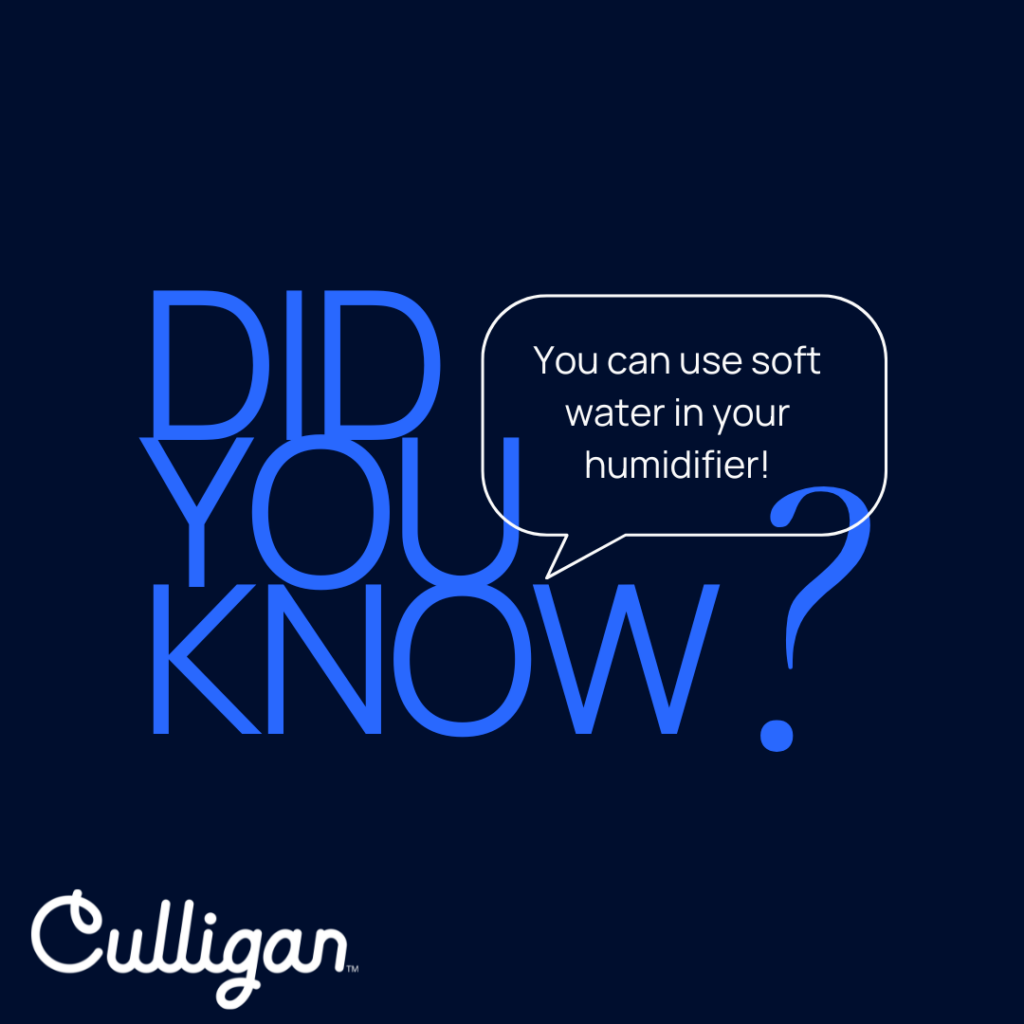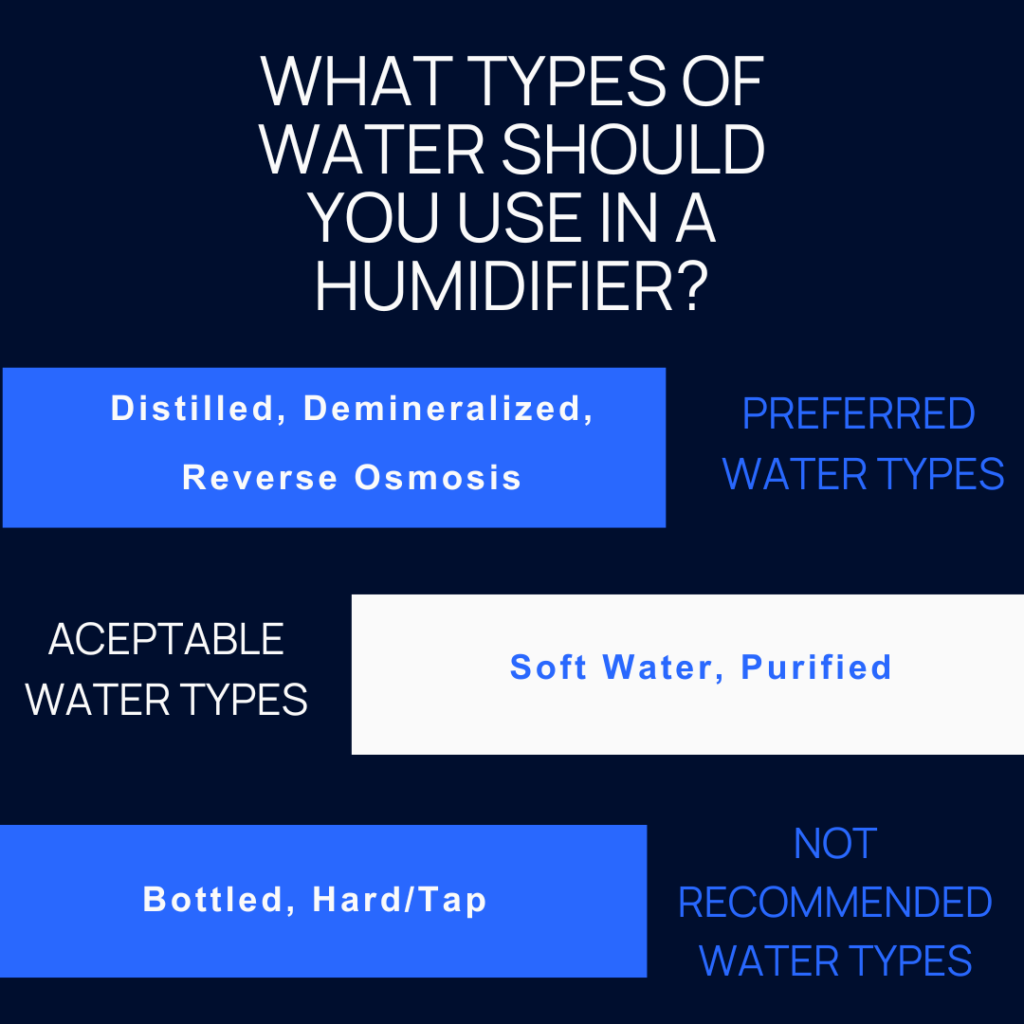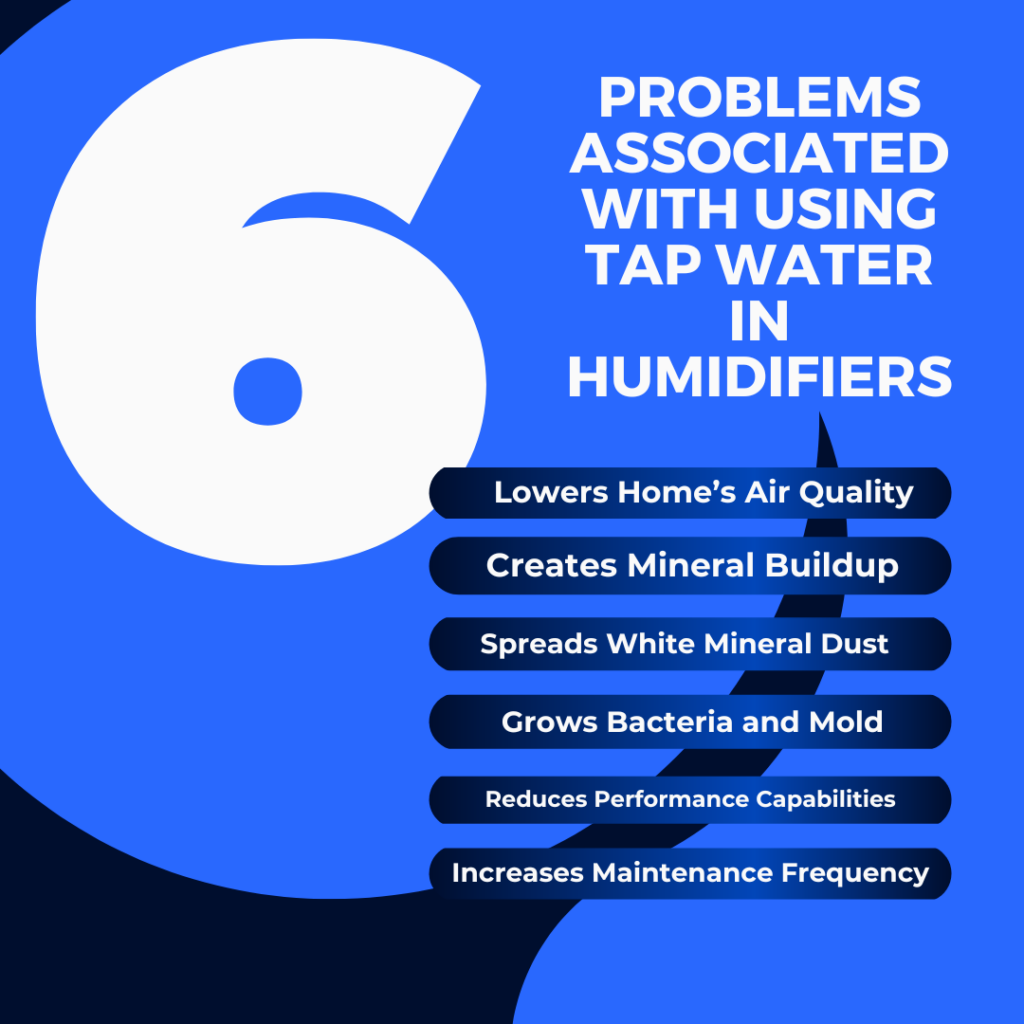Can I Use Soft Water In My Humidifier?
Quick Summary: Yes, you can use soft water in a humidifier—and it’s a better choice than hard water. Soft water contains fewer minerals, which means less scale buildup, longer humidifier life, and reduced risk of white dust in your home. While distilled water is still the top choice for humidifier use, soft water is a convenient, lower-maintenance alternative that improves performance without the cost or hassle of buying bottled water. If you’re using a Culligan Water Softener, you’re already ahead in protecting your humidifier and your indoor air.
If you own a humidifier, you know how essential clean water is for keeping it running well. One common question many people ask is: Can you use soft water in a humidifier?
The short answer is yes, you can use soft water in a humidifier. In fact, soft water is usually better than hard water. Soft water contains fewer minerals, which means it causes less scale buildup inside your machine. However, while soft water is a better choice than untreated tap water, distilled water remains the top recommendation for humidifier use. Let’s break down why, how soft water compares to other options, and how to keep your humidifier performing at its best.

Humidifiers can transform the environment of your home and reintroduce water back into dry air. To accomplish this, your humidifier needs to be filled with water that is then distributed into the air supply in your home, eliminating desert-like conditions inside. However, not all water is of equal quality and the water that you put in your humidifier affects how the machine functions and how long it can operate.
How Humidifiers Work
A humidifier works by storing water in a reservoir, converting that into water vapor or mist through various mechanisms, such as a water heater or a vaporizer and then releasing the moisture into the air to increase humidity levels in a room or space. This process helps alleviate dryness in the air, which can be particularly beneficial during winter months or in dry climates, potentially relieving issues like dry skin, sinus congestion, and irritated nasal passages.
However the type of water that you fill your humidifier with can affect the productivity or effectiveness of your machine. Water quality is definitely a factor in deciding what water to fill your humidifier with, and depending on the type you use, the water quality may be detrimental to your machine.
How Water Type Affects Your Humidifier
Humidifiers work by turning water into a fine mist that adds moisture to the air. The quality of the water you use has a big impact on the humidifier’s performance and your indoor air quality.
Hard Water Problems
Hard water contains high levels of minerals, especially calcium and magnesium. When hard water is used in a humidifier, these minerals don’t evaporate with the water. Instead, they leave behind a white, chalky residue called “scale” inside the device. Over time, this buildup can:
- Clog the humidifier
- Reduce mist output
- Force the unit to work harder
- Shorten the humidifier’s lifespan
- Release minerals into the air, forming “white dust” that can settle on surfaces and irritate lungs
If you’ve ever noticed a fine dust coating your furniture after running a humidifier, hard water is likely to blame.
Why Soft Water Is Better
Soft water is treated to remove most of the calcium and magnesium that cause hardness. Water softeners, like those from Culligan Water, replace these minerals with small amounts of sodium or potassium.
Using soft water in your humidifier dramatically lowers the risk of scale buildup compared to using hard water. Since there are fewer minerals present, there’s less material to clog the machine or settle into your home’s air.
However, soft water is not completely mineral-free. It still contains trace amounts of sodium and other dissolved solids. These small mineral amounts are less likely to cause major problems but could still leave some buildup over time, depending on your water softening system and how often you use the humidifier.
What Types of Water Should I Use In A Humidifier?
Different types of water affect humidifiers in unique ways, so understanding the differences between types of water is important whenever you are deciding what to use in your humidifier. Common household drinking water types are
- Hard/Tap
- Soft
- Distilled
- Demineralized
- Purified
- Reverse Osmosis
Preferred Water Type
Types of water that contain the least amount of particulate matter are the most preferred by humidifier manufacturers. The three types of water that fit this description are demineralized, distilled and reverse osmosis.
Demineralized
Demineralized water is water with most mineral ions removed through processes like deionization. This makes demineralized water devoid of any of the minerals that benefit human health. Using demineralized water in humidifiers is preferred due to the lack of minerals but it is not recommended for everyday drinking, and only buying this type of water for your humidifier may seem like a waste of money and water.
Distilled
Distilled water has been put through a distillation process to remove impurities. Distillation involves water being boiled into steam and condensed back into liquid, removing nearly all minerals. Distilled water is recommended by humidifier manufacturers as it has the least amount of particulate matter that can clog your humidifier with buildup.
Reverse Osmosis
Reverse osmosis is a water purification process that uses a semipermeable membrane to remove ions, molecules, and larger particles from water. This type of water is very accessible to consumers if they install a reverse osmosis filtration system in their houses, which is possible with Culligan.
Acceptable To Use
Soft Water
Soft water is water treated to remove excess minerals, particularly calcium and magnesium, resulting in a “softer” feel. While it is not on the short list of recommended water types for humidifiers, it is still a very good option to go in your humidifier compared to less filtered water.
Purified Water
Purified water is water treated to remove impurities, chemicals, and contaminants, often through filtration or other processes. Purified water is free from bacteria, fungi and parasites because they have been specifically filtered out.
Not Recommended to Use
Hard/Tap Water
Hard/Tap Water is supplied to homes through pipes, containing high levels of minerals like calcium and magnesium. Mineral deposits can be found in tap water, like iron, sulfur, or fluoride.
Bottled Water
Water packaged in bottles for consumption, sourced from various origins and potentially treated differently.Bottled water is not all created the same, and due to there being so many options available, there is no definitive standard of quality that exists among the numerous brands of bottled water.

Distilled Water: The Best Option
Distilled water is considered the gold standard for humidifiers. It goes through a boiling and condensing process that removes almost all impurities, including minerals, salts, and chemicals.
When you use distilled water:
- There’s no mineral buildup inside the humidifier
- No white dust is released into the air
- The humidifier operates more efficiently and lasts longer
In short, distilled water minimizes cleaning needs and improves indoor air quality the most. If you want the best care for your humidifier and your lungs, distilled water is the safest bet.
That said, constantly buying distilled water or running a distiller at home isn’t convenient or affordable for everyone. This is where soft water becomes a practical, much better alternative to hard tap water.
How Does Soft Water Work in a Humidifier?
Each type of water is composed differently which allows for such distinctions to be made between each type. Because of this, adding different types or compositions of water will affect your humidifier, household and health in unique ways.
Soft water is water that has been filtered through a water softener, which removes calcium and magnesium. Softeners also generate an ion exchange, a process that replaces minerals with sodium and potassium ions, creating soft water that contains less minerals than typical tap water.
Why Shouldn’t I Use Tap Water In My Humidifier?
Most home’s regular tap water is often filled with many different minerals and compounds, making it also known as “hard” water. Water suppliers are not legally obligated to completely filter out most compounds, leaving these potential pollutants in your water, like fluoride, nitrates, bacteria, and many other substances. Check out our Solution Center, for more detailed information on the various compounds that could be present in your tap’s water.
If you put your tap water into your humidifier, contaminants and other substances that are present in the water are going to be introduced into the air, which could be problematic to your environment and humidifier.
What Happens If I Use Tap Water in My Humidifier
If hard water is the only water you have access to, you still can put it in your humidifier, but there are some problems associated with doing so:
- Negative impacts to your home’s air quality
- Creates mineral buildup in your humidifier
- Spreads white, mineral dust around your space
- Grows bacteria and mold in your humidifier
- Reduces humidifiers performance capabilities
- Increases frequency of humidifier maintenance
Water quality is a very important factor in the functionality and effectiveness of your humidifier. Tap or hard water is not recommended for humidifiers as they limit the performance capabilities of the machine. Soft water, distilled water and reverse osmosis water is recommended for humidifiers as they contain less minerals and are much more filtered. If you are unsure about whether your water is hard or soft, Culligan provides free water tests, where a professional comes to your house to test your water’s hardness and the potential pollutants that are present.

Why Soft Water is Better for Your Humidifier Than Tap
Soft water in humidifiers is more recommended than hard water from your tap, as it will not leave as much scale on your machine as mineral-filled tap water. That is not to say that soft water is incapable of generating scale and leaving residue on your humidifier, but it leaves less than hard water would. Culligan offers water softener systems that are able to turn your hard water into soft water for not just your humidifier, but any water needs in your home!
Drawbacks of Softened Water In My Humidifier
The buildup of scale created by soft water is created by the salt that is added to the water softener. With frequent cleaning and regular maintenance of your humidifier, the sodium scale on your machine should not be an issue, your humidifier needs to be cleaned often to prevent mold and other issues, and the type of water you use does not change this fact.
Benefits of Reverse Osmosis Water In My Humidifier
If scale generated by soft water is a worry for you, Culligan also offers reverse osmosis filters. Reverse osmosis filtration is a multi-stage filtration process that removes up to 97% of dissolved minerals. Chemically similar to distilled water, reverse osmosis water is as particulate free as water is able to be, and with a filter this water is coming from your kitchen sink!
Humidifier manufacturers and medical professionals recommend using distilled or reverse osmosis water in their products to limit the amount of bacteria growth and scale inside the machine. With a reverse osmosis filter in your home, you have access to the type of water that is most recommended for humidifiers!
Tips for Using Soft Water in a Humidifier
If you decide to use soft water, a few extra steps can help you get the best results:
- Clean the humidifier regularly. Even with soft water, some mineral traces can build up. Follow your humidifier’s cleaning schedule to avoid problems.
- Use filtered soft water if possible. If your water softener is paired with a filtration system, even better. Removing additional contaminants helps your humidifier stay cleaner longer.
- Monitor for white dust. Although unlikely, if you notice fine dust appearing, you may want to switch to distilled water for a cleaner operation.
- Check your manufacturer’s instructions. Some humidifiers specifically recommend using distilled water. Always check first to keep your warranty valid.
